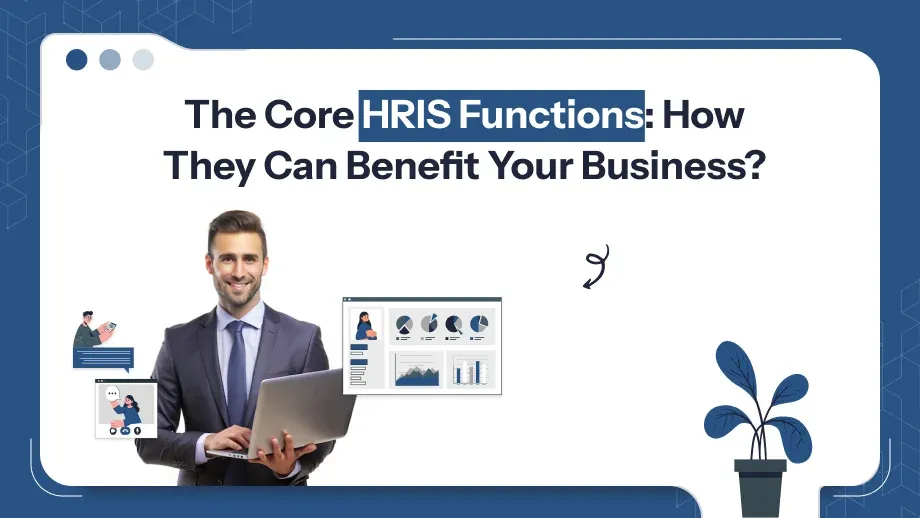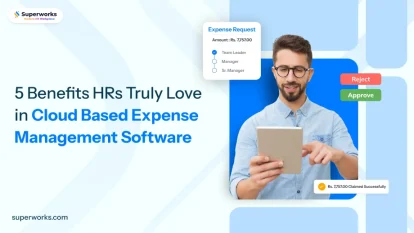
In the fast-paced world of business today the ability to efficiently manage human resources is essential to ensure the success of your organization. HRIS functions play an essential part in simplifying HR processes, decreasing mistakes made by hand while increasing productivity overall. From monitoring employee information to reducing payroll costs An HRIS could change the way you run the HR department. Let’s take a look at the primary HRIS features, their value, and their potential to aid your business.
What is HRIS? – HRIS Definition
An HRIS also referred to as a Human Resource Information System, is a platform for digitalization that integrates HR operations and procedures and the latest technology in information. It functions as a central platform to handle employee information as well as payroll, recruitment performances, as well as others.
HRIS definition: A device designed to gather store, organize, and analyze information about human resources, which will ensure more efficient HR processes and strategic decisions.
Objectives of Human Resource Information System
The goals that are the focus of the objectives of Human Resource Information System (HRIS) focus on improving efficiency in HR departments with automation and data-driven insight. Key objectives include:
- Centralizing Employee Information: Store employee records, contracts, and attendance data in one accessible platform.
- Enhancing accuracy in data collection: Reduce human errors through automatization of repetitive HR routines.
- The HR Process Streamliner: Make it easier to streamline the HR process by streamlining hiring, payroll processing, and tracking performance.
- Enhancing Decision-Making: Provide real-time analytics and insights to optimize HRIS software for small business strategies.
- Ensuring Compliance: Maintain compliance with labor laws and organizational policies.
- Improve Decision Making: Offer immediate analytics and insight to improve HRIS functions software small business plans.
The Core HRIS Functions
The following are the essential HRIS functions that can transform how your HR department operates:
1. Employee Information Management
HRIS acts as a central center to manage and store the personal details of employees such as their information, work roles as well as attendance, and measures of performance. It eliminates the requirement for manual records, increasing the accuracy of records and making them more accessible.
2. Recruitment and Onboarding
HRMS software solution streamlines the process of hiring by automating processes like managing post-employment advertisements, tracking applicants’ schedules for interviews, and the onboarding process. The new hires can complete their documents online, making the whole process more efficient and speedier, as well as providing a smooth experience for the HR team and employees.
3. Attendance and Time Tracking
HRIS keeps track of the attendance of employees, their work hours, requests for leave as well as overtime. It assists in identifying patterns of absence and helps ensure conformity with the company’s policy.
4. Payroll Management
The automation of payroll processing is among the most important HRIS functions. The software calculates salary as well as bonuses, taxes, and deductions precisely, thus ensuring the timely payment of your payments.
5. Performance Management
HRIS facilitates performance reviews, feedback collection, and goal setting. With regular performance tracking, HR managers can identify training needs and recognize top performers.
6. Benefits Administration
HRIS simplifies the management of benefits, including benefits like health insurance, retirement plan as well as bonuses. This makes it simple to assign and manage the benefits of employees.
7. Compliance Management
HRIS assures compliance with rules governing labor and taxation as well as company policy. It helps audits be more efficient by maintaining correct and current documents.
8. Training and Development
HRIS software helps plan and monitor employee training programs, enabling HR to improve workforce skills and boost productivity.
9. Reporting and Analytics
HRIS gives you extensive reports and analysis about HR performance metrics, such as attendance rates, attrition as well as payroll. These data-driven insights enable HR personnel to make informed decisions based on data.
Double Your HR Team’s Efficiency with Streamlined HRIS Functions!
Automate payroll, attendance tracking, and compliance management in one platform. Experience smarter HR operations today.
Types of HRIS
Different types of HRIS systems cater to specific organizational needs:
- Operational HRIS: Handles day-to-day HR processes like employee records such as attendance, payroll, and pay.
- Tactical HRIS: focuses on training, recruitment, and management of performance.
- Strategic HRIS: Coordinates HR processes with the goals of the organization by providing strategic workforce planning.
- Comprehensive HRIS: Integrates strategic, tactical, and operational strategic functions for complete HR management.
The Need for HRIS
As businesses grow, coordinating the HR process manually is no longer efficient. The need for HRIS comes from these challenges:
- Data Overload: The handling of massive amounts of data from employees could result in errors that are not automated processes.
- Compliance Risks: HRIS management software can help ensure compliance with labor law and the regulations governing data security.
- Time-Consuming Processes: HRIS functions automates tasks like the process of hiring and paying employees, which saves important time.
- The ability to scale: HRIS Solutions are flexible which makes them ideal for businesses that are growing.
- Improved Decision-Making: Real-time Analytics offered by HRIS help support strategic HR decision-making.
Advantages of HRIS System
The advantages of HRIS system include numerous benefits that improve HR processes and employee satisfaction:
- Efficiency: Automates manual tasks like payroll, attendance, and data management, reducing workload.
- Cost Savings: Minimizes administrative costs by improving accuracy and efficiency.
- Accuracy of Data: Limits Human errors through automation of HR procedures.
- Improved Employee Experience: Boosts employees’ satisfaction by enhancing communications and transparency.
- The ability to scale: HRMS software in India adjusts according to the needs of organizations and ensures long-term useability.
- Strategic Insights: Provides data-driven insights for better decision-making.
The Importance of HRIS
The importance of HRIS is in its capacity to improve HR efficiency and provide value to companies. Key reasons include:
- Centralized HR Management: Combines all HR information into one central system.
- Improved Compliance: Assures the compliance of regulatory requirements, while reducing legal risk.
- Employee Empowerment: Employees can use self-service portals to manage requests for leave, attendance as well as benefits.
- Analytical Decision-Making in Strategic Decisions: Real-time Analytics assist in identifying trends and improving HR processes.
- Enhanced Productivity: Automation frees the HR professional’s time to work on more strategic projects.
HRIS Process
The HRIS process is the steps that an organization takes to implement and employ an HRIS effectively. The process includes:
- Data Collection: Take any relevant information regarding employees which includes personal details and job descriptions, as well as information about performance and pay specifics.
- Data Input and Storage: Insert the data you have collected into the HRIS platform, which will ensure security and central storage.
- Data Processing: Automatize HR functions like payroll calculations and attendance tracking, as well as hiring, and reviews of performance.
- System Integration: Integrate free HRIS software with enterprise systems, such as accounting projects, project management, or communications tools to run your business seamlessly.
- Data Analysis and Reporting: Use HRIS analytics tools to create detailed reports on the most important HR indicators, like productivity, employee turnover, and the compliance of employees.
- Decision-Making: Make use of data-driven insight to improve HR processes, identify the needs of employees, and ensure HR processes are aligned with the objectives of the organization.
- Self-Service for Employees: Allow employees to control their personal information, request leave, access the details of their pay, and monitor their work via self-service portals.
- Continuous Improvement: Continually evaluate the performance of HRIS, find the areas of weakness, and then update the options to boost its efficacy.
HRIS Model
The HRIS model is the structure that defines how an HRIS functions works to improve HR procedures. It allows an unimpeded integration of data, technology, and procedures to improve work management. The HRIS model works through the following main stages:
The collection of employee-related data including personal data such as attendance records, pay data, and performance indicators.
The input process ensures accurate and consistent data collection across all HR activities.
Central storage of the employee’s information in a safe and readable form.
Make sure that data security is in compliance with rules while ensuring data integrity.
Automates HR-related tasks like calculation of tax deductions, payroll leaves management, tax deductions, and the tracking of performance.
HRIS and payroll software handle large amounts of data effectively, which reduces manual intervention as well as mistakes.
Produces appropriate dashboards, reports, and data analytics that aid in the process of making decisions.
The outputs are performance summaries, reports on payroll, as well as workforce productivity indicators.
- Feedback and Optimization:
Continuous feedback from the system helps HR teams identify gaps and areas for improvement.
Ensures the HRIS evolves with changing business needs and workforce dynamics.
HRIS Tools
There are a variety of HRIS tools and software instruments available on the market that address certain requirements of HR. These tools include:
- HRIS Employee Portal: Allows employees to track their time off benefits and leave information.
- HRIS and Payroll Software: Payroll processing is automated, which ensures prompt payments.
- Free HRIS Software: This is perfect for small-sized businesses that have budgetary constraints.
- Best HRIS Software: Includes sophisticated features such as analysis, performance management as well as conformity.
How HRIS Functions Benefit Businesses?
The core HRIS functions bring measurable benefits to businesses of all sizes:
- Time Savings: Automation of repetitive HR functions, allowing HR professionals to concentrate on the strategy.
- Data-Driven Insights: Offers actionable information to help HR process optimization.
- Cost Efficiency: Reduces administrative expenses by streamlining operations.
- Enhanced Compliance: Ensures adherence to labor laws and policies.
- Increased Customer Satisfaction: Streamlines the interactions of employees through self-service portals.
Conclusion
In modern workplaces, HRIS functions is essential to controlling the workflow of employees effectively. From managing employee information to performance and payroll tracking and the ability to comply, an HRIS can simplify HR processes, reducing time while reducing expenses. If you’re a small company or an enterprise of a larger size adopting an HRIS will improve efficiency and help the HR department.
For more information on advanced HRIS solutions to help your company take a look at HRMS payroll software in india and as the first step to transform your HR process.







